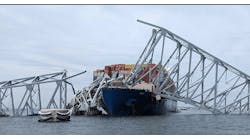You know how the Twilight saga has transformed vampires in women's eyes from evil monsters to attractive, desirable alternatives to us male, mortal mutts? I think the current economic situation is giving warehousing the same kind of image makeover. Where storage was once a necessary evil, now, with consumer demand coming back, many retailers are wishing they'd have had the foresight to stock up on the supplies customers are starting to demand.
Now the New York Times and Wall Street Journal are reporting that retailers are fighting for freight, outbidding each other to get space on ships. At the same time, expedited freight companies like FedEx are winning big with their international priority services that guarantee delivery by a certain date.
The heroes on the retail side are those material handling and logistics pros who anticipated the return of demand and started scheduling shipments and preparing their distribution centers months in advance. These people who were once invisible to the national business media are now their darlings, and are being courted for quotes. That case I just mentioned of the retailer with the foresight to get their warehouse in order was presented in a New York Times story.
The material handling industry is getting smart about accommodating the other 80 percent of supply chain managers who didn't anticipate the speed of their customers' return. For example, I just interviewed Mike Kotecki, senior vice president at HK Systems, for an ROI story MHM will be doing in September. He told me the economy has taught many companies to maintain a cash rich and liquid position rather than get bogged down with a lot of assets on their books. This is important as they face consolidation or divestitures, where they don't want a lot of long term debt. Koteck told me this has been a big opportunity for his company.
A couple of their clients have been taking advantage of HK Logistics, where HK –owns and operate facilities for them and provides their supply chain as a service. This gives the client the benefits and ROI of warehouse automation without having to pay for the automation in one lump sum.
This kind of thing may give the material handling industry an image makeover too. Kotecki says clients are starting to look at automation's ROI in a new light.
“I'm hearing customers more creatively and more open mindedly approaching ROI and looking for things that are traditionally a little softer, like product damage and employee satisfaction, sales value, depreciation, flexibility, growth potential, visibility—things that are a little less easy to quantify. They hope to come out of this recession with a more technological solution than just hiring five forklift guys back.”
I don't think those forklift guys need to worry, though. The industrial truck industry is getting an image makeover too. Of course MHM will continue to stay on top of that, but don't be surprised if our brethren in the business papers start stalking you for stories.


